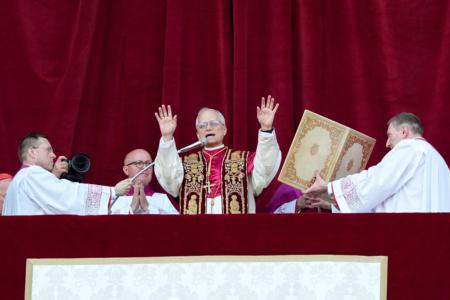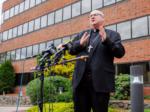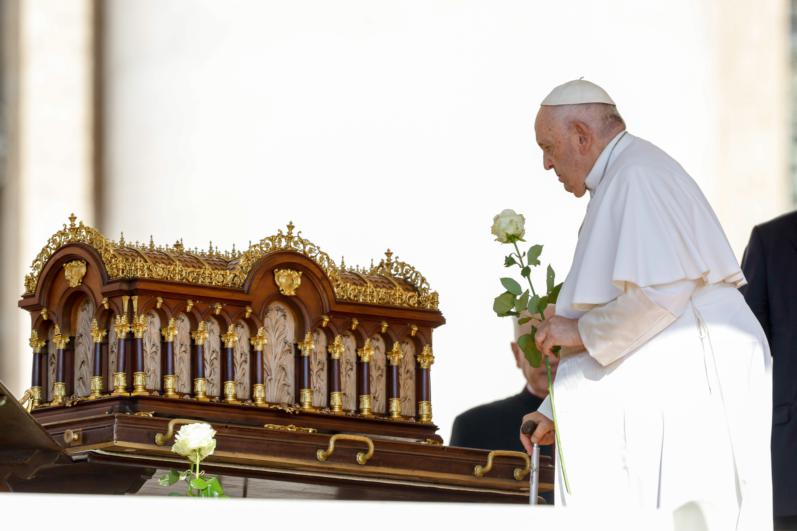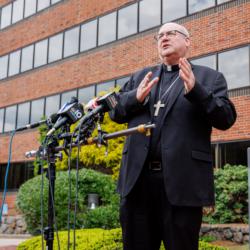Pope plans to write document dedicated to St. Thérèse of Lisieux
VATICAN CITY (CNS) -- Individuals become Christian because they have been touched by Christ's love, not because they have been convinced or coerced by someone else, Pope Francis said.
The Catholic Church needs missionary disciples who have hearts like St. Thérèse of Lisieux and who "draw people to love and bring people closer to God," he told people at his weekly general audience in St. Peter's Square June 7.
"Let us ask this saint for the grace to overcome our selfishness and for the passion to intercede that Jesus might be known and loved," he said.
The pope continued his series of talks about "zeal" for evangelization by focusing on St. Thérèse, the 19th-century French Carmelite nun who is patron saint of missions and a doctor of the church.
Before beginning his general audience talk, the pope walked with his cane to a large reliquary containing the relics of St. Thérèse that was placed on a table near where he sits to deliver his catechesis. He placed a large white rose before the ornate reliquary and stood a few moments in prayer.
During his catechesis he announced he was planning to dedicate an apostolic letter to her to mark the 150th anniversary of her birth this year.
Pope Francis has said he has a special devotion to the saint, once telling an interviewer that he used to keep a photo of this 19th-century French Carmelite nun on his library shelf when he was archbishop of Buenos Aires. He told journalist Sergio Rubin in 2010, "When I have a problem I ask the saint, not to solve it, but to take it in her hands and help me accept it, and, as a sign, I almost always receive a white rose."
St. Thérèse displayed patience, trust in God and a "spirit of humility, tenderness and goodness," that God "wants from all of us," Pope Francis has said.
During his Wednesday general audience talk, the pope asked Christians to find inspiration in the life of St. Thérèse, who lived "according to the way of littleness and weakness," defining herself as "a small grain of sand."
She lived in poor health and died at the age of 24, but "her heart was vibrant, missionary," the pope said.
The Carmelite nun wanted to be a missionary and served, from her monastery, as a "spiritual sister" to several missionaries, accompanying them through her letters and prayers, he said.
"Without being visible, she interceded for the missions, like an engine that, although hidden, gives a vehicle the power to move forward," Pope Francis said. "Such is the power of intercession moved by charity; such is the engine of mission!"
Therefore, missionaries are not only those who "travel long distances, learn new languages, do good works and are good at proclamation," he said. "No, a missionary is anyone who lives as an instrument of God's love where they are" so that "through their witness, their prayer, their intercession, Jesus might pass by."
St. Thérèse's daily resolution was to "make Jesus loved" and to intercede for others, the pope said. "Following the example of Jesus the Good Shepherd, her zeal was directed especially toward sinners."
Apostolic zeal never works with proselytism or coercion, he said. "One does not become a Christian because they are forced by someone, but because they have been touched by love."
"The church needs hearts like Thérèse's, hearts that draw people to love and bring people closer to God," he said.
The pope ended the audience with his usual greetings to special guests and then went to Rome's Gemelli hospital for abdominal surgery that was scheduled for that afternoon. He was expected to remain for several days, according to the Vatican press office.



















